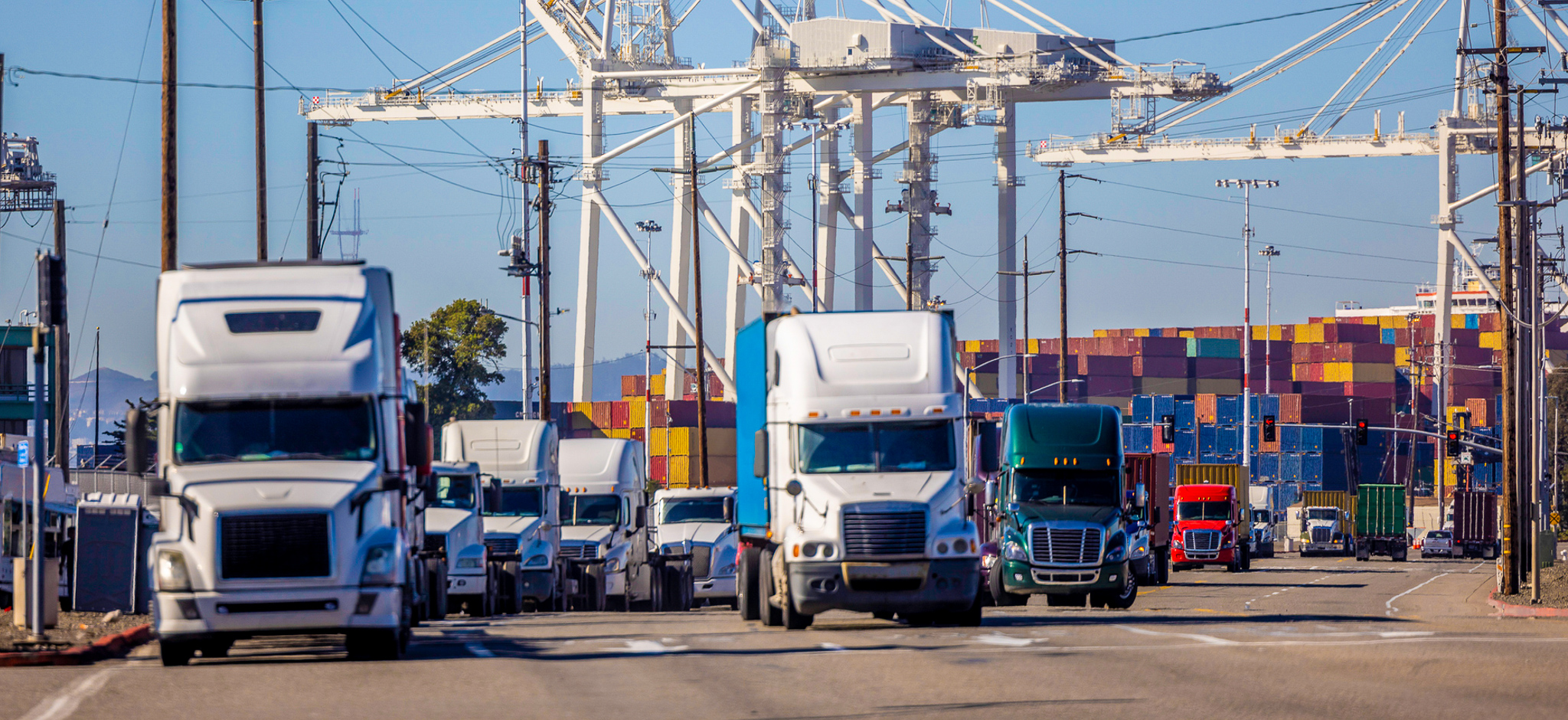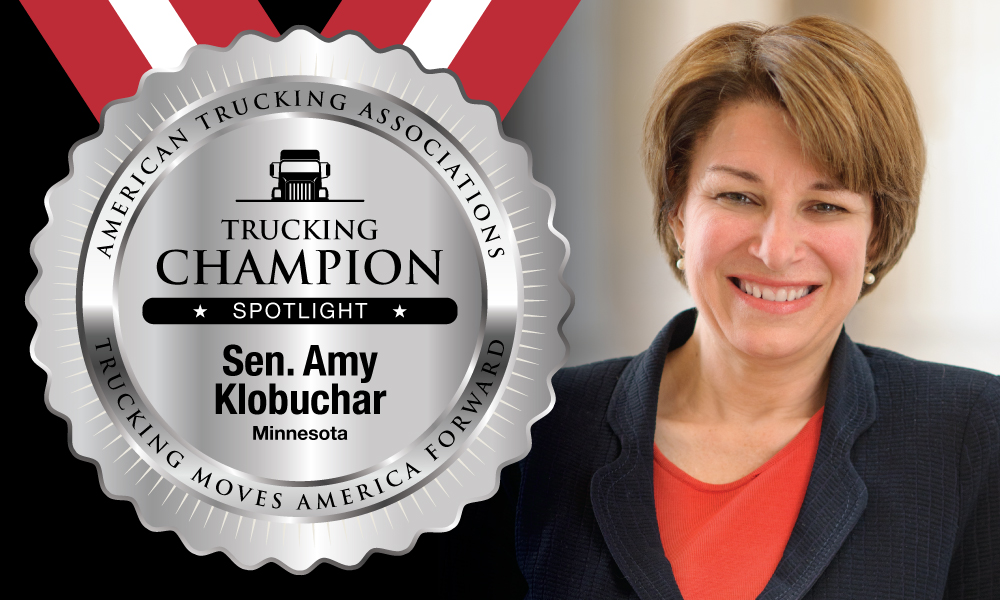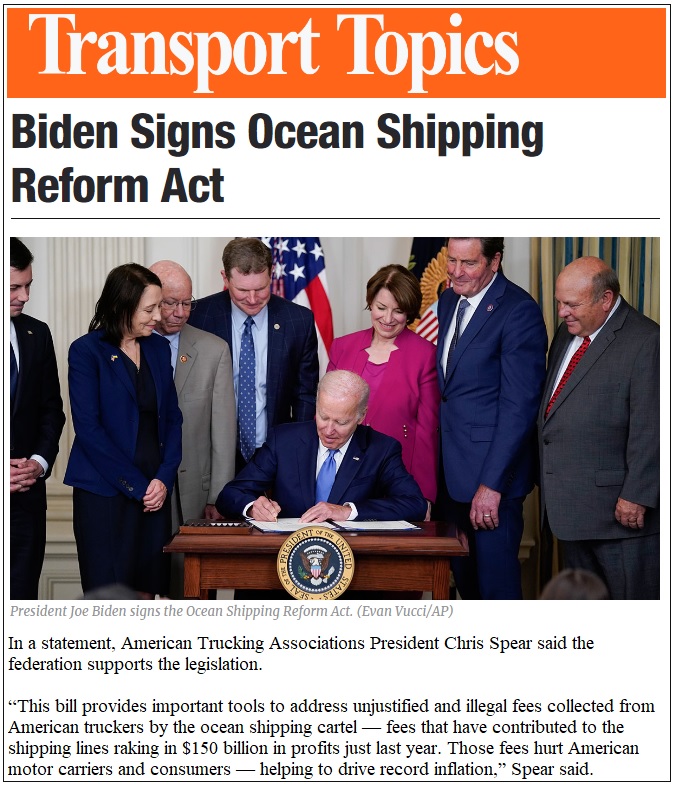
When the pandemic triggered disruptions throughout the global supply chain one year ago, all eyes soon turned to U.S. ports. Record backlogs saw dozens of container ships anchored off-coast waiting to unload. Consumers were left wondering if their holiday packages would arrive on time, while policymakers debated what could be done to clear the logjams. For truckers, it was an opportunity to shed light on maritime issues that were festering long before COVID entered the scene.
For years, U.S. trucking companies and consumers have been getting fleeced by foreign-owned ocean carriers’ abusive business practices. Detention and demurrage fees are but one example, which are imposed on truckers by shipping lines when containers are not picked up or returned “on time.” Although designed to keep freight moving, these charges often occur when delays are caused by factors entirely outside of the truckers’ control, such as hours-long lines to enter the terminal, or even caused by the ocean carriers themselves. Ocean carriers even charge these fees on weekends when ports are closed.
The trucking industry knew that any true, long-term fix to the inefficiencies in our port systems needed to address these deeply rooted issues. That would require federal legislation – and champions on Capitol Hill who have the wherewithal to shepherd a serious bill through a bitterly divided Congress paralyzed by inaction. Thankfully, trucking had Senator Amy Klobuchar of Minnesota in our corner.

From her position on Senate Commerce, Science, and Transportation Committee, Senator Klobuchar drew public attention to the issues impacting truckers in our ports. She authored the Ocean Shipping Reform Act and used her influence in the Senate to secure its passage with overwhelming bipartisan support. This law marks the first major overhaul of ocean shipping regulations in more than two decades. Among other things, it combats unjust and unreasonable detention and demurrage charges while providing the Federal Maritime Commission new tools to ensure ocean carriers are treating American truckers, shippers, and exporters fairly.
.@SenAmyKlobuchar is right: we need to protect American truckers and consumers from unfair fees levied by the cartel of foreign-owned ocean carriers in our nation's ports. #PassOSRA pic.twitter.com/pUHKTEAW9D
— American Trucking (@TRUCKINGdotORG) March 4, 2022
“I was proud to lead the bipartisan Ocean Shipping Reform Act which is cracking down on unfair conduct by international ocean carriers that have hurt American truckers with service delays at our ports and unreasonable fees," says Senator Amy Klobuchar. “Now that this bill has been signed into law, we are working to make sure that our truckers will soon be able to experience lower costs and better efficiency across the supply chain.”
Minnesota is home to a vibrant trucking industry that is crucial to the state’s agricultural, mining, and manufacturing sectors. They depend on trucks to move 96.5% of Minnesota’s manufactured tonnage – everything from auto parts, heavy machinery and medical equipment to iron ore, cereals, and sugar beats. More than 141,470 Minnesotans work in trucking, earning an average salary of $54,000, as they keep the state’s economy moving forward. With the port of Duluth and multiple ports of entry along its border with Canada, Minnesota is a critical freight connector in the Midwest and an important conduit of international trade.
Senator Klobuchar’s contributions to trucking don’t end with maritime reform. The American Trucking Associations is proud to work with her on efforts to grow and strengthen the industry’s workforce through bills like the JOBS Act. This legislation would lower the time requirements for prospective truckers to receive federal Pell grants, thereby allowing them to apply that financial assistance toward technical schooling and truck driver training.
She’s also a leading advocate on the industry’s most important issue of all: highway safety. As a nationwide rise in distracted driving jeopardizes the safety of all road users, Senator Klobuchar is working to combat this trend by ensuring motorists keep their phones down and their eyes on the road. She secured grant funding in the Infrastructure Investments and Jobs Act to ensure more states have the necessary resources to enforce distracted driving laws and educate drivers about the dangers of distracted driving.
“In Minnesota, more than 140,000 truck drivers power the economy by transporting almost 97% of manufactured tonnage” said John Hausladen, President of the Minnesota Trucking Association. “As a leading advocate for trucking in our state, the Minnesota Trucking Association is proud to work with Congressional leaders that understand trucking’s biggest challenges and are working across political lines to deliver for Minnesota’s, and America’s truckers.”
On behalf of a grateful industry, we thank Senator Klobuchar for being a champion for truckers in Minnesota and across the United States of America.
Q&A with Senator Amy KlobucharWhat do you appreciate most about the trucking industry?Their hard work and how they spend long days and nights on the road to deliver the goods we need across our country. What role do truckers play in the Minnesota economy?Truckers are essential to driving our state’s economy forward, making it possible for our agricultural and retail products to reach customers across the country and, in many cases, around the world. That’s why I’m focused on solutions to tackle supply chain disruptions affecting our truckers. I was proud to lead the bipartisan Ocean Shipping Reform Act which is cracking down on unfair conduct by international ocean carriers that have hurt American truckers with service delays at our ports and unreasonable fees. Now that this bill has been signed into law, we are working to make sure that our truckers will soon be able to experience lower costs and better efficiency across the supply chain. If you could describe Minnesota truckers in one word, what would it be?Grit. How can elected officials better support the men and women of trucking?In addition to solutions to fix our supply chains, I’m also focused on ensuring our roads are as safe as possible, given the long hours our truckers spend driving. I was proud to secure resources in the Bipartisan Infrastructure Law last year to create safer roadways. What song tops your long-haul playlist?Girl from the North Country – Bob Dylan |
